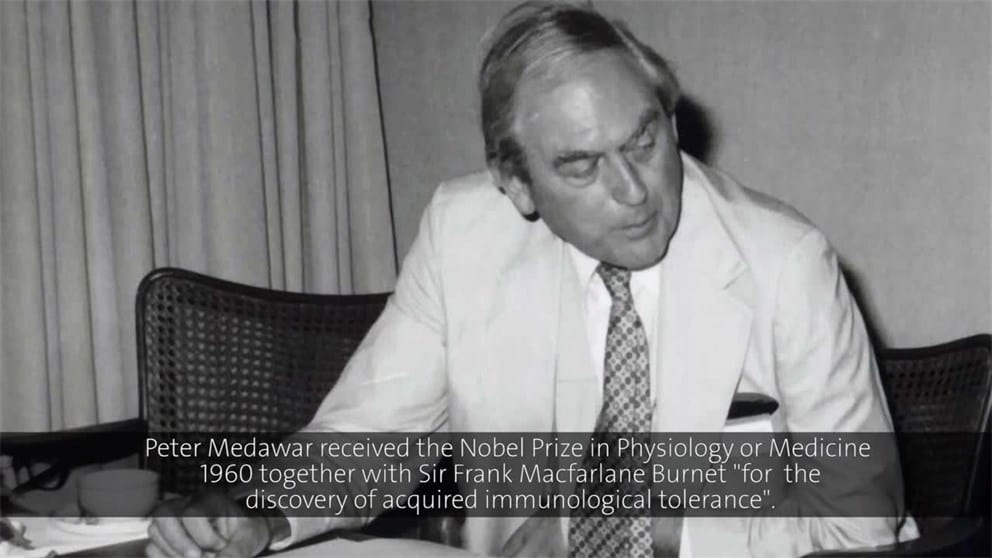The Lebanese scientist awarded a Nobel Prize is Peter Brian Medawar who was born in 1915 in Rio De Janeiro, Brazil, to a Lebanese father with British nationality.
He studied zoology in Oxford, then pathology anatomy after graduation, and continued his work in scientific research related to medicine.
He began working in Oxford and then in London. He was then appointed director of the National Institute for Medical Scientific Research in the year 1962.
The Lebanese scientist’s research began in the study of tissue transplantation and in the regeneration of peripheral nerves. During World War II, he was asked to investigate the cause of the body’s rejection of any skin taste taken from another donor.

Medawar was the Chairmen of Zoology at the University of Birmingham (1947-1951) and then at the University of London (1951-1962), and held other prestigious scientific positions.
Some of his published researches are The Uniqueness of the Individual (1959), The Future of Man (1959), Plato’s Republic (1982), and Memoirs of a Thinking Radish (1986).
The prevailing theories up to that time were that vertebrates inherit the ability to distinguish their tissues from the tissues of any other vertebrates during pregnancy.
Medawar conducted studies on cattle twins by vaccinating one of the twin’s skins with skin taken from the other twin.

The immunologist noted that the graft was not rejected by the body in the real (monozygotic) twins, while it was rejected in some dizygotic twins and accepted in others.
It was clear to Medawar and his colleagues that the reason for this acceptance is that the dizygotic twins exchange considerable amounts of erythrocytes during pregnancy. This made the twins count the erythrocytes as their own.
According to the scientist, the transplantation of skin from a third team leads immediately to its rejection and excretion, as it includes all tissues of the twins and is not limited to one particular fabric.

Australian Frank M. Burnet was the first to say that there was “acquired immunological tolerance”. Mudawer adopted the Burnet theory and added his own research into it.
He demonstrated that newborn mice can acquire immune tolerance by injecting other donor mouse cells, thereby gaining tolerance to their cells and tissues as well as to cells of true twinning and tissue.
As a result of this study, Medawar developed his theory of “organ immunity”, which was the basis for his subsequent studies on tissue transplantation and organ transplantation.
Medawar and his colleagues thus came to present his theory of “acquired immunological tolerance” for homografts. This discovery earned him many awards, including the Nobel Prize.

He was awarded the Knighthood in 1965 and the Order of Merit in the year 1981. Earlier in 1951, he was elected a Fellow of the Royal Academy in recognition of his scientific contributions.
The Lebanese scientist was also awarded the Gold Medal Medal in 1959, and the Nobel Prize for Medicine and Physiology in 1960 in partnership with Frank Macfarlane Burnet.

Peter Medawar is the first scientist of Lebanese origin to be awarded the Nobel Prize in Physiology (Medicine).
Medawar confirmed in part of his Nobel prize acceptance speech that he “used this discovery and demonstrated with [his] colleagues that this natural manifestation of immunological tolerance can be achieved experimentally in fetuses or in newborns.”

He explained in his time many aspects of immune and autoimmune diseases, as well as in the advancement of human transplantation technologies. The scientist died at 75 years old in London.
According to the Nobel Prize official website, Medawar won the Nobel Prize for the discovery of acquired immunological tolerance in The Nobel Prize in Physiology or Medicine 1960.

The website explains: “He could perform new transplants on the mice when they became adults, something that did not work when the transplants were not performed during the fetus stage. The results had significance for organ transplants.”

















